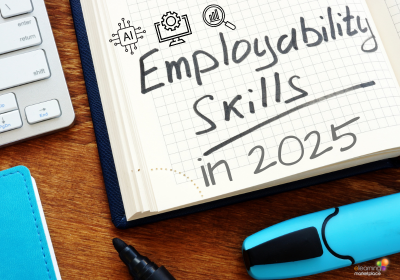
The 15th July marked the 10th anniversary of United Nation’s World Youth Skills Day. Ten years ago, UN declared this date as a day to celebrate the importance of preparing young people with employability skills, a decent work ethic and an entrepreneurial mindset. The theme however this year was Youth Empowerment through AI and Digital skills. UN Secretary-General António Guterres stated: “(a)s AI reshapes our world, young people must be seen not just as learners – but as co-creators of a fairer digital future.” But should we all be seen like this in the age of AI?
Whilst it is important to prepare young people for the world of work, it is just as important for those already clocking up the years of employment to refresh their skills and employability. But what does this ’employability’ look like in 2025? What skills are employers looking for?
Be work-ready with the right employability skills
Surprisingly AI is actually not top of the list for employability skills, according to the World Economic Forum’s Future of Jobs Report. No, the number 1 spot for highest priority for skills training from 2023-2027 is analytical thinking. And close on its heels in second place? Creative thinking.

These cognitive skills are growing in importance due to the need for complex problem-solving in the workplace. This means training workers to utilise AI is in third place, with 42% of the surveyed companies prioritising this subject in their skills-training strategy.
The Report also revealed 40% of employers will prioritise training and development in leadership and social skills. 32% will focus on resilience, agility and flexibility in light of hybrid workplaces and remote working policies. Other trends driving skills demand and influencing business strategy include environmental sustainability, data-driven decision-making, and cybersecurity. Most noteworthy of all, however, is that 30% of companies prioritise the employability skill of curiosity and lifelong learning. 1
We live, we learn. Learning never stops!
As an FE teacher for 17 years, I know being ‘work-ready’ is a vital part of a young person’s education. From general employability skills like CV writing to interviewing, to communication skills such as working through conflicts or disagreements. But even these have digitally evolved. Now they will benefit from creating a professional LinkedIn profile and knowing how to communicate virtually. It is no surprise that this year’s World Youth Skills Day focuses on digital skills when globally “54% of countries have digital skill standards”[1] and “48% of students do not feel adequately prepared for an AI-enabled workplace.”[2]

The Conservative government in September 2013 passed into law that all children should be in education or training up to the age of 18. This grew the importance of being ‘work-ready’. It also brought problems. Young people resented the fact that they had to stay in learning environments. They had to pick whatever was available in terms of their ability (GCSE score). Or they had to pick from what was being delivered at their local sixth form, college or education provider.
The last decade has also seen a shift from academic pathways to more practical and industry-led programmes, especially in FE colleges. But how prepared are students for the world of work? And how many realise that learning is a life-skill and key to their employability? Something that 30% of companies are looking for in terms of employability as well as prioritising in their training and development initiatives.
Beyond the classroom is CPD
I recently spoke with a head of Sixth Form about what they saw as a useful and transferrable employability skill for young people. He had decided that his sixth formers, in today’s digital world, would benefit from a touch-typing qualification. And this is the sort of specific skill-set we should be offering the youth of today.
Moving beyond CVs and interviews, youth employability should look at bridging the worlds of education and work. Shouldn’t we be teaching our young adults now the benefits of CPD? Because unbeknown to them, even when they get a job, learning never stops.

When we think about progression for young people in post-16 education, there should be a focus on upskilling them for the transition into work. The ONS reported in the first quarter of this year that 625,000 young people aged 16 to 24 were unemployed, 42,000 more than the previous year. The unemployment rate for young people was 14.3%, up from 13.6% from the year before.[3]
Before I left teaching, one of my final training events I attended was around the role of AI in education. This was two years ago, but back then the room rippled with nervousness around such technology. Teachers were afraid of what it would mean for their jobs, that the tasks of assessment and assignments would become automated by machines instead of their own expertise and skillset. Teachers were also afraid that their students would not think outside of the box, but simply hand in whatever ChatGPT or AI had generated for them. This fear is not to be dismissed when according to a global UNESCO survey, less than 10% of schools and universities provide formal guidance on AI.[4] Being able to analyse and create alongside and with AI is perhaps the most important skill we can develop.
Our Top Ten for 2025’s Top Employability Skills
With UN’s World Youth Day seeking to build the best future with young people’s AI and digital skills, here are our top 10 e-learning course recommendations based on 2025’s top employability skills. Whether for personal or professional development, improving your employability, or as an introduction to training for those soon-to-be leaving FE, when we continue to learn, we continue to grow.

- Essential Digital Skills – CPD/ECSC Approved (includes cyber security)
- Effective Emails
- Virtual Communication
- Copilot in Microsoft 365 for Beginners
- Introducing Artificial Intelligence (AI) Course Bundle
- Emotional Intelligence – CPD Approved
- Critical Thinking
- Leadership Styles and Qualities – CPD Approved
- Hybrid Working – CPD Approved
- Introduction to Analytics and Artificial Intelligence
Author: Helen German
July 2025
Sources
[1] Global Education Monitoring Report 2023: Technology in education – A tool on whose terms? Paris, UNESCO: https://unesdoc.unesco.org/ark:/48223/pf0000385723
[2] https://unevoc.unesco.org/pub/wysd_2025_infographics.pdf
[3] https://commonslibrary.parliament.uk/research-briefings/sn05871/
[4] UNESCO global survey, 2023 https://www.unesco.org/en/articles/unesco-survey-less-10-schools-anduniversities-have-formal-guidance-ai?hub=32618
[4] UNESCO global survey, 2023 https://www.unesco.org/en/articles/unesco-survey-less-10-schools-anduniversities-have-formal-guidance-ai?hub=32618







 UK: 0844 854 9218 | International: +44 (0)1488 580017
UK: 0844 854 9218 | International: +44 (0)1488 580017








